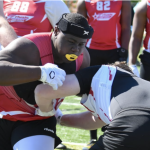 By: Chad Wilson – Editor GridironStuds Blog
By: Chad Wilson – Editor GridironStuds Blog
Twitter: @GridironStuds
Youth football is all the craze down here in the state of Florida. Parks across the state on a Saturday morning in the Fall are packed with onlookers filled with hope, pride and emotion. Somewhere in those oversized pads and helmets is the next Aaron Rogers, Adrian Peterson or Richard Sherman. Ask any or all of the parents in attendance and they’ll tell you that their kid will be the next NFL superstar.
As a father of two that have gone through the youth football ranks, I am blessed to have the wisdom to reach back to the parents that are now embarking on the youth football journey. I know my message will fall on many a deaf ear and blind eye because emotion fuels the heart when it comes to children. However, if I can reach the mind of a few, I can help some kids have a chance to succeed in this sport but more importantly have a healthy relationship with their parents.
As a coach of youth football for seven years, I would like to say I’ve seen it all but that’s not true, the stories are still coming. However, I have seen plenty a parent ruin a kid’s love for the game with undue pressure to perform at unrealistic levels. I was once told by an assistant coach who’s son was on the team that his son was “The Michael Jordan of the football team.” Well what do you say to that? The truth of the matter is that at ages 6-13, the game will rarely ever be as important as it is to the parent. Ages 6-18 are the fun years. Those are the years where there are no bills, office politics, relationship drama, etc. The last thing a kid needs is to endure hair losing pressure from a parent that’s keeping stats and charting performances of a player that is still waiting for his two front teeth to drop in.
I always told overzealous parents that wanted to predict their child’s assured trip to Canton this line “We don’t know anything until your child goes through two things, puberty and girls”. Those two elements have destroyed more certain athletic careers than any injury you can name. So until they encounter those enormous hurdles, let them enjoy the ride.
How do we allow the youngster to enjoy his time on the youth football field?
(1) Support his game day performance good or bad especially if you never make it to practice. The worst is the dad who I never saw all week going off on his kid on game day. You have no clue how that performance on Saturday matched up with what was done Monday through Friday. That 10 yard run that you thought should have been a 60 yard touchdown might be the first time he ever got out of the backfield with a ball in his hand.
(2) Don’t coach his technique or scheme if you aren’t on the coaching staff. The best way to screw junior up is by having him do things your way when that’s not the coach’s way. You won’t believe the incredible techniques I have seen dropped on my coaching staff on a Monday night practice. Now the coaches have to spend the next three days getting the young man back on to the same page. Needless to say he won’t be ready mentally for Saturday and guess what Pops, you’ll be going off on him again around 3 PM Saturday afternoon.
(3) Advise and I mean advise not punish him for the life skill things you see him doing or not doing. Put away your whistle mom and dad. The only coaching you should engage in should be on your son’s punctuality, effort, leadership and camaraderie. These are the life building skills that will be the most important part of your child’s youth football experience. Advise him on those things. If you see him finish first in the pre-practice lap or not finish last if that’s where he normally finishes then please acknowledge that! Tell him how that will make him better. If you see him encouraging a teammate that just screwed up on game day, tell him how that will make him a dependable adult. Your acknowledgement encourages this behavior in the future. It also helps you when you “calmly” approach him about punching a player after the whistle, sitting on the end of the bench by himself or disrespecting a coach. He will listen if he knows you will also recognize his good.
(4) Sometimes all you need to say when the game or practice is over is “good game” or “great practice”. That one phrase on you way to a trip to McDonalds could be the Vince Lombardi of motivational speeches. Now he can’t wait for tomorrow’s practice or next week’s game. He wants to try and make mom and dad proud again.
As I reflect back on my time as a youth coach and parent, I realize that the best games the kids played were the “throw up tackle” or “kill the man with the football” games after the real game was over. I often saw kids that were not very good in practice or games turn into Michael Jordan in the post game “throw up tackle” contest. One day, I did have to ask why this was the case and here was the answer:
“because there were no coaches and parents there yelling at me. I was just having fun”
With that, the young man said a mouthful, now will you listen?
Related articles across the web

Chad Wilson is a college football recruiting expert and creator of the GridironStudsApp which allows high school football players to gain exposure to college football coaches and fans. Wilson is a former college football player for the University of Miami (92-94) and Long Beach St. (’90-’91) and played briefly for the Seattle Seahawks (’95). He is also a former youth and high school football coach for over 15 years most recently for 5-A State of Florida Champs American Heritage. He runs All Eyes DB Camp a defensive back training company located in South Florida IG: @alleyesdbcamp. Wilson’s oldest son Quincy plays in the NFL for the New York Giants and his younger son plays cornerback for the Arizona Cardinals.






